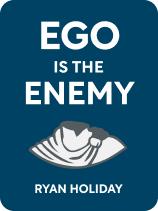

This article is an excerpt from the Shortform book guide to "Ego Is the Enemy" by Ryan Holiday. Shortform has the world's best summaries and analyses of books you should be reading.
Like this article? Sign up for a free trial here .
Is Ryan Holiday’s Ego Is the Enemy worth reading? Why does Holiday argue that ego kills success notwithstanding the fact that many successful people are famously egotistical?
In Ego Is the Enemy, Ryan Holiday defines ego as an unhealthy belief in one’s own importance that goes beyond mere confidence He notes that many successful people are famously egotistical, and he contends that as a result, society tends to think that ego is an important ingredient in success as if ego leads to accomplishment. However, Holiday argues that ego leads far more often to failure and that people find success only when they are able to subdue it.
This Ego Is the Enemy book review takes a look at the book’s inspiration and background, intellectual context, and its key strengths and weaknesses.
Ego Is the Enemy: The Fight to Master Our Greatest Opponent
In his book, Ego Is the Enemy, bestselling author and marketer Ryan Holiday defines ego as a sense of superiority that makes us see everyone around us as either subservient or oppositional. Further, he discusses the ways an unchecked ego can destroy your success at three different periods: first, as you’re striving for success, second, as you’re trying to maintain the success you’ve achieved, and third, when you’ve lost success and need to recover from failure. He offers insights into how to understand and counter your ego so it doesn’t stop you from living up to your potential.
To make his arguments, Holiday draws on the philosophies of Stoic thinkers, advising us to resist the urges of our emotions in order to maintain clarity of thinking. In our guide to his book, we’ll examine his theories through the lens of Stoicism, and we’ll compare them to other management theories that similarly aim to help you find success.
About the Author
Ryan Holiday is a media strategist and bestselling author. After dropping out of college at age 19, he made a name for himself as a marketer with American Apparel and later founded a marketing agency advising corporations like Google and authors like Tony Robbins. During his marketing years, he was known for media stunts that drew attention to his clients in unusual or controversial ways—such as trying to manufacture boycotts of his clients’ products for publicity.
He has changed his focus during his career. His first book, Trust Me, I’m Lying, aimed to expose deceitful marketing techniques, but with his third book, The Obstacle Is the Way, he started to focus on the philosophies of Stoicism, a school of thought concerned with ethics that he’d been introduced to in college. He’s since released several more books on how to incorporate Stoic philosophies into your life, all of which have become bestsellers.
Connect with Ryan Holiday:
The Book’s Publication
Ego Is the Enemy was published in 2016 by Portfolio, an imprint of Penguin that focuses on business books. It was featured in NPR’s list of Best Books of 2016, and Inc.’s 2016 list of Must-Read Business Books for the Summer. It also made it onto the bestseller lists of USA Today, Chicago Tribune, and Publishers Weekly.
It was Holiday’s fourth book. It followed up on and fleshed out further the Stoic ideas discussed in The Obstacle Is the Way, published two years earlier, which had been a surprise bestseller and put Holiday on the map for something other than marketing strategy.
The Book’s Intellectual Context
Stoicism is a line of ethical philosophy that traces its origins back to the third century BC. It holds that humans can find happiness only in virtue, and that any other elements of life—health, money, power, simple pleasures—are neither good nor bad in themselves but should exist only to serve the pursuit of virtue. Stoics teach, therefore, that people should not desire pleasures or fear threats but should view them unemotionally as things that can help them live virtuously. Holiday was introduced to these ideas in college through the collected writings of the Roman Emperor Marcus Aurelius, which are widely seen as foundational texts of the philosophy.
Stoicism fell out of favor as a system of ethics as Christianity took over, but it has experienced a revival starting in the late 20th century. While contemporary thinkers in the philosophy follow the overall original outlines of it, they disagree on some of the finer points—for example, as to the right way to view material goods and pleasures. While all Stoics agree that you should temper your desires and seek to live virtuous lives, some believe it’s acceptable to also hold desires for material things (as long as those desires don’t interfere with your virtue), while others recommend that you more strongly resist indulging in pleasures as it violates the Stoic belief in an unemotional attachment to anything outside of virtue.
Holiday seems to side with the former camp. He interprets Stoicism not just as a way of life but also as a means to an end. The end he envisions is a successful life, and he never advocates that you live a humble life and reject fame, wealth, and power. Instead, he advises that you chase these things with a cool head, because if you allow your ego to take over, you’ll lose everything. His theories can be seen as a means to an end, not an end in and of themselves: He’s not advocating that you live a life of abject humility, but rather, that you strike a balance that allows you the trappings of success without losing your head. This places him firmly in the company of contemporary Stoics.
Many of Holiday’s ideas overlap with ideas from other experts who offer insights on finding success. His advice is part of a contemporary cultural thread that advocates for putting other peoples’ needs in front of your own in order to achieve your ultimate aims and encourage you to seek meaningful success rather than the superficial or unstable success an ego desires. He now runs a website, dailystoic.com, filled with articles from contemporary Stoic thinkers and videos narrated by himself on Stoicism.
Holiday has commented in interviews that he views his book as timely because of the rise of internet-fueled self-promotion and so-called “self-esteem parenting,” both of which have brought about an “epidemic of ego.”
The Book’s Critical Reception
Ego Is the Enemy received generally positive reviews. Most readers posting reviews lauded the book for its clear insights, often saying it opened their eyes to the many dangers of ego and that it should be required reading for business leaders.
Those who posted negative reviews had a few common objections:
- Holiday picks his examples to illustrate his theories but ignores the vast number of highly egotistical people who ended up successful (for example, he discusses the humility of baseball great Bo Jackson but doesn’t mention any of the other great athletes who’ve risen to success with enormous egos—of which there are many).
- Many of the people he uses as examples to illustrate a lack of ego are in fact, hugely egotistical in ways he ignores (for example, he touts the way Genghis Khan suppresses his ego by listening to advisers, but he ignores the way Khan’s ego drove him to kill millions of people and rape countless women).
- He misinterprets Stoic ideals in a way that allows for too much worldly desire—many readers felt his use of Stoicism as a means to an end was a violation of the true spirit of the philosophy.
Some readers also questioned the sincerity of Holiday’s devotion to Stoicism, asking if he lives the life he advocates or simply uses Stoic messages for profit. They point out that while he advocates for an egoless life, he puts his face and name prominently on his books, markets them assertively, and has a well-stocked “store” page on his Stoic-themed website selling everything from autographed books to medallions with Stoic sayings. (Holiday responded to one reader on Goodreads explaining that he signs his work because it makes him accountable for its contents.)
In a related vein, some readers point out that Holiday seems to define success materially, as dependent on a successful career, while true Stoics might define success more as peace of mind.
Commentary on the Book’s Approach
Holiday uses many anecdotes to illustrate his examples, and while this is often a strength of the book—by showing how his ideas have played out in the real world, the reader gets a better understanding of how to incorporate them into their own lives—he sometimes leaves out the logical connections that definitively connect his examples to his ideas. Therefore, the book sometimes reads more like a collection of disconnected stories rather than an instructive text.
Further, because he sometimes glosses over the details of his anecdotes and provides no sources to back them up, the reader is occasionally left with a feeling of being asked to trust Holiday without solid reason.
For example, Holiday briefly references Napoleon’s failed invasion of Russia, noting that the general most likely entered the engagement brimming with confidence, only to endure great losses. He does not explore the issue in any more detail but instead implies that Napoleon’s ego was his undoing without mentioning any of the other factors that went into the failure (for example, Russia’s unexpectedly poor infrastructure and its unproductive farmland that left Napoleon’s troops unable to live off the land when their supplies ran out). It might be argued that Napoleon had merely followed a typical military strategy of the day that had repeatedly worked for him and was therefore a logical move (sending a large force into a localized region). Whether or not Napoleon had been advised otherwise and ignored that advice because of his ego is not something that Holiday discusses.
In other words, he sometimes refers to examples of failed leaders or business people who had large egos but doesn’t show a causal link that would demonstrate that their ego was the primary factor leading to their downfall.
However, despite the occasional weakness of Holiday’s illustrative examples, they generally demonstrate the concept he’s discussing, even if more context might reveal other analyses.

———End of Preview———
Like what you just read? Read the rest of the world's best book summary and analysis of Ryan Holiday's "Ego Is the Enemy" at Shortform .
Here's what you'll find in our full Ego Is the Enemy summary :
- How to resist your emotions so you can keep thinking clearly
- Why your passion may be preventing you from achieving your goals
- How to apply the philosophy of Stoicism for success as a leader






